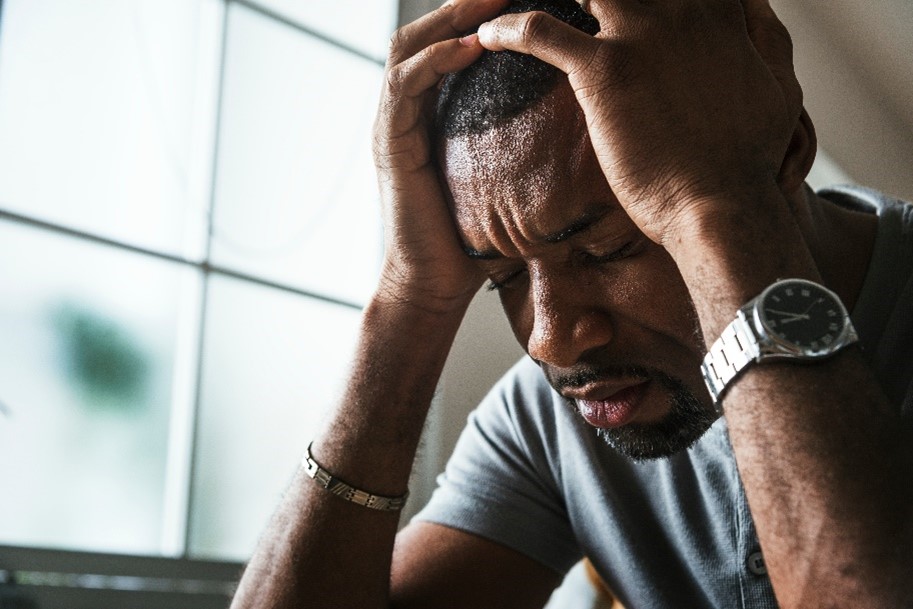
Everyone has their share of good and bad days. Life is filled with many ups and downs. Some days may be so bad that we have trouble doing what we need or want to, or we might not feel like doing anything at all. This could bedepression.
People who have limb loss or other traumas are considered at risk for depression. So are those with diabetes or other chronic conditions. People with both limb loss and diabetes are even more likely to have depression. Depression and poor health form a vicious cycle. For instance, a person with depression may not eat right, take medication correctly, or follow medical advice. This can lead to poor health. As the person’s health gets worse, so does the depression.
Depression can affect a person’s mood (feelings), mind (thoughts) and actions. Depression can also affect how the body functions and even relationships with others. Here are some symptoms of depression:
- Sad feelings that last more than two weeks
- Loss of interest in things you usually enjoy
- Changes in appetite: wanting to eat a lot more or much less
- Changes in weight: gaining or losing noticeable body weight
- Trouble sleeping: either sleeping too little or too much
- Restless feelings: like you always have to be doing something
- Little or no energy
- Feelings of being guilty or worthless
- Trouble thinking or paying attention
- Frequent thoughts or death or suicide
Depression affects men, women, and children of all ages and backgrounds. Men and women often cope with depression in different ways. For instance, women may become withdrawn and avoid people. They may also gain or lose a lot of weight. For help, women may look to their friends and family. Men may say they feel tired or grouchy, not depressed. To cope, men may drink, use drugs, work too much, or engage in reckless behaviour such as driving cars too fast. Children react to depression differently to adults. Family related stress can exacerbate depression in children.
People with a lot of stress or problems such as losing jobs or getting divorced, may have depression. People with poor health are also at risk for depression. The good news is that depression can be treated. Here are some things you can do:
- Make an appointment for a medical examination. Talk with your doctor about any symptoms of depression. Your doctor can check whether these are due to physical illness, medication or depression.
- Ask for a referral to a mental health professional. He or she can talk with you about treatment options such as therapy and antidepressant medication.
- Stay active. Make an effort to do activities you enjoy, such as walking, yoga or other types of light exercise.
- Be with others. Try not to always be alone. Many people with depression find it helpful to join a support group (either in person or online). This is a way to talk with others who are dealing with problems like yours. Ask your doctor or mental health professional about support groups that are right for you.
- Be patient. Do not expect too much from yourself right away. It takes a while to feel better after depression. The good news is that millions of people with depression feel better each day.

While it is normal to feel sadness as part of the grieving process, serious depression should be treated. It may be hard to separate grief and depression, but the chart below will help you.
| Normal grief | Clinical Depression |
| You are able to respond to comfort and support. | You cannot accept comfort or support. |
| You are often openly angry. | You are irritable and may complain but do not directly express anger. |
| You can relate your depressed feelings to your experience of loss. | You do not relate experiences to a particular life event. |
| You can still experience moments of enjoyment in life. | You have a sense of doom that overshadows your days. |
| You may have physical complaints that come and go. | You have physical complaints most or all of the time. |
| You might express guilt over some aspect of the amputation. | You feel guilty about most things much of the time. |
| These feelings can affect your self-esteem. | Your self-esteem is low most of the time. |
If you are thinking of suicide help is available 24 hours a day, call Lifeline on 13 11 14 or Emergency Services on 000.
Dispelling some common depression myths
Depression isn’t a real illness and you can snap out of it if you want to.
Depression is recognised as a legitimate illness. Severe depression may require a variety of management strategies including medication and professional counselling. Talking to family or friends can help but severe depression requires professional intervention.
Depressed people are overemotional attention seekers.
The idea that depression is a choice that people make for the attention is pervasive in society, but it is very wrong. Depression is a distressing condition, nobody with it enjoys it and much of the attention received is negative.
Talking about your feelings makes you dwell on them.
The media has given people the wrong idea about therapy: it is not all talking about your childhood. Therapists are there to help you with coping strategies in addition to talking about your feelings.
Depression is a female thing.
While it is true that women seek treatment in higher numbers than men, it does not mean that women are more likely to get depression. Men often worry about being seen as weak if they admit to depression and do not seek help. This is due to cultures where men are seen as stoic and women are seen as emotional.
Medication makes you an emotionless zombie.
Antidepressants do not affect your personality. The brain chemicals altered are not connected to your personality traits. Antidepressants have common side effects, but these can be managed with appropriate treatments.
It is expected that you would feel sad after something like an amputation
You will experience grief, but depression is different. You may not feel just sad; most likely you will feel fatigued, overwhelmed, guilty, anxious and sad. Grief and sadness become less over time, depression does not.

